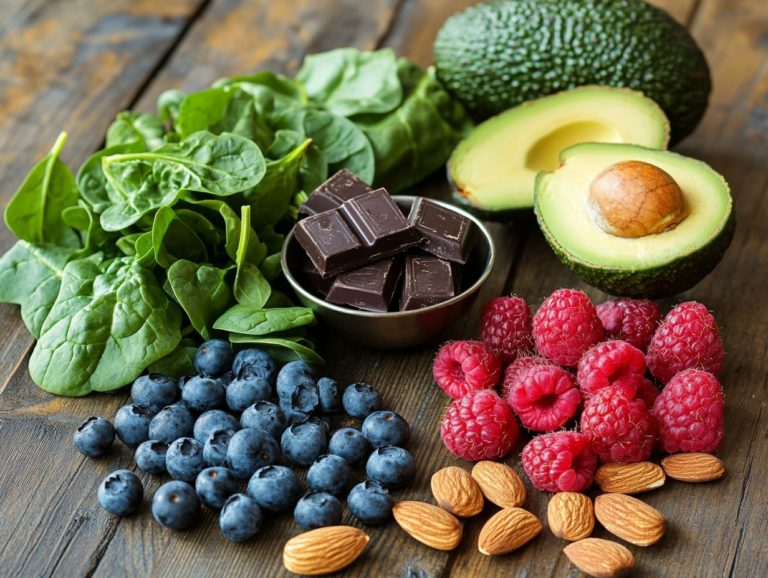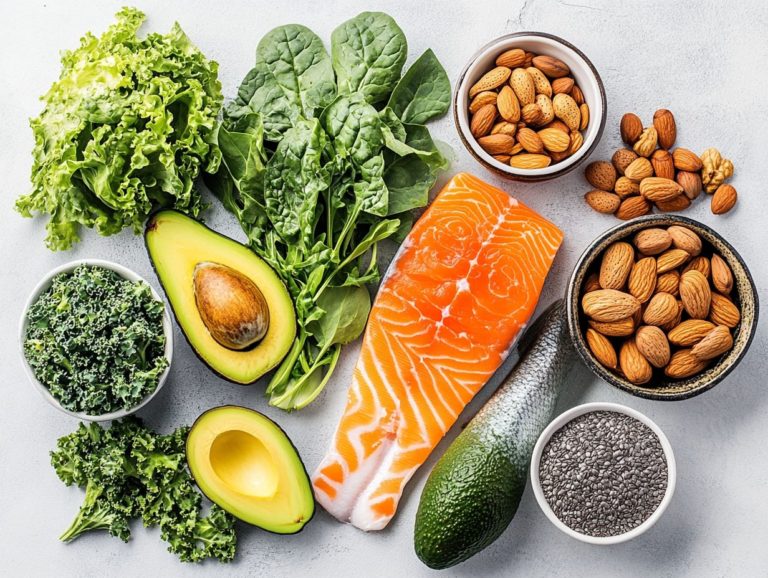How to Maintain Nutritional Balance on Keto
The Keto diet has surged in popularity, hailed for its potential to revolutionize health and wellness through a low-carb, high-fat approach. Guided by principles of lifestyle medicine, this diet emphasizes healthy behaviors and nutrition therapy.
This article delves into the essentials of the Keto diet, outlining its myriad benefits, from effective weight loss to enhanced energy levels, while also addressing the potential risks involved. Consulting with a registered dietitian can provide expert advice and personalized nutrition guidance.
You will find practical tips for maintaining nutritional balance on this eating plan, along with a list of foods to avoid for optimal results.
Whether you are contemplating the Keto lifestyle or seeking to refine your current regimen, this guide equips you with valuable insights and information.
Contents
- Key Takeaways:
- What is the Keto Diet?
- What are the Benefits of the Keto Diet?
- Improved Blood Sugar Control
- Increased Energy Levels
- What are the Potential Risks of the Keto Diet?
- 2. Incorporate a Variety of Vegetables
- 3. Include Healthy Sources of Fat
- 4. Don’t Neglect Protein
- 5. Consider Supplements
- What Foods Should Be Avoided on a Keto Diet?
- Frequently Asked Questions
- What is a keto diet and how does it affect nutritional balance?
- How can I maintain nutritional balance while on a keto diet?
- Can I still eat fruits and vegetables on a keto diet?
- What are some potential nutrient deficiencies on a keto diet?
- How does hydration play a role in maintaining nutritional balance on keto?
- Can I still enjoy treats and snacks on a keto diet?
Key Takeaways:

- Choose whole, nutrient-dense foods to maintain nutritional balance on Keto and avoid nutrient deficiencies.
- Incorporate a variety of vegetables and healthy sources of fat to provide necessary micronutrients and support weight loss.
- Avoid high-carb, processed, and sugary foods to effectively stay in ketosis and reap the full benefits of the Keto diet.
What is the Keto Diet?
The keto diet, or ketogenic diet, is a high-fat, low-carbohydrate approach crafted to encourage nutritional ketosis a metabolic state where your body shifts to burning dietary fat for energy instead of carbohydrates. Experts like Jill Gulotta and Scott Keatley endorse this approach for its numerous nutritional benefits.
By significantly cutting back on carbs and embracing healthy fats such as omega-3 and monounsaturated fats, you can initiate transformative health changes and achieve meaningful weight loss. This diet prioritizes whole food sources and lean proteins, aligning with dietary guidelines that emphasize optimal macronutrient ratios while ensuring you get enough protein to preserve muscle mass and support your metabolic health.
What are the Benefits of the Keto Diet?
The benefits of the keto diet are extensive and well-supported by long-term research, showcasing its effectiveness in promoting weight loss, enhancing metabolic health, and even aiding in the management of specific health conditions.
This high-fat, low-carb approach not only helps you achieve a calorie deficit but also provides therapeutic advantages for those facing insulin resistance and various metabolic disorders.
Experts stress the significance of maintaining sustainable dietary habits for long-term weight management, positioning the keto diet as a viable strategy for lasting health.
1. Weight Loss
Weight loss stands out as one of the most compelling advantages of the keto diet, with many individuals witnessing remarkable reductions in body weight through a clever blend of caloric intake reduction and appetite suppression. By embracing the ketogenic approach, you encourage your body to undergo a metabolic transformation and metabolic adaptation, tapping into fat stores for energy. This shift fosters a sustainable calorie deficit essential for effective weight management and weight maintenance.
As your body adapts to this new energy source, you not only promote fat loss but also find that cravings for carbohydrates often diminish, enabling you to feel fuller for longer periods. Many people report shedding anywhere from 10 to 30 pounds within the first month, driven by these physiological changes. Take, for example, a recent success story of someone who lost 15 pounds in just four weeks, crediting much of their progress to reduced hunger pangs and improved control over their eating habits.
It’s crucial to emphasize the significance of maintaining a calorie deficit, as it serves as the bedrock of any weight loss strategy. This approach gives you the power to sustain fat burning over time, paving the way for lasting results.
Improved Blood Sugar Control
Improved blood sugar control is one of the standout benefits of the keto diet, especially for those struggling with insulin resistance and related health issues. By minimizing your carbohydrate intake, the keto diet helps stabilize your glucose levels, reducing the chances of pesky spikes and crashes that often lead to cravings and overeating.
Numerous studies have shown that adopting a ketogenic approach can significantly enhance glycemic control, making it an appealing option for anyone managing diabetes. Research published in esteemed journals like Nutrition & Metabolism highlights how participants often report decreased hemoglobin A1c levels, indicating improved long-term blood sugar management.
Experts support this dietary shift, noting that a low-carb intake fosters consistent energy levels and improved health conditions, freeing you from reliance on quick-fix snacks. Personal testimonials further bolster these claims, with individuals sharing success stories of enhanced energy and overall well-being after embracing the keto lifestyle.
These experiences show that adopting the keto diet can be a game-changer for your health.
Increased Energy Levels
You may find that increased energy levels are a common experience for those who embrace the keto diet. This is largely due to your body s transition to burning fat as its primary fuel source, which tends to provide a more stable and sustained energy output compared to relying on carbohydrates.
This shift can significantly enhance your overall metabolic health and encourage healthier lifestyle choices. As your body adapts to the state of ketosis, glycogen stores will deplete, prompting a greater reliance on dietary fats for energy.
This transition not only allows for a more consistent release of energy but also helps stabilize your blood sugar levels, effectively reducing those dreaded energy crashes and cravings. Incorporating fasting periods can further enhance this metabolic shift.
When fat becomes your main fuel source, you might notice improved mental clarity and focus, which can elevate your productivity throughout the day. This metabolic transition stimulates your body s fat-burning processes, promoting weight loss and enhancing fat oxidation benefits that contribute to both your physical and mental stamina.
Notably, expert Alyssa Tucci and Kayli Anderson advocate for the management of energy levels through this dietary approach.
What are the Potential Risks of the Keto Diet?

While the keto diet boasts an array of benefits, it’s essential for you to recognize the potential risks that could accompany such significant dietary changes.
Common concerns include the possibility of nutritional deficiencies resulting from restricted food groups, the unwelcome arrival of keto flu as your body transitions into ketosis, and an elevated risk of kidney stones for certain individuals. Grasping these risks is vital for preserving your long-term health and well-being.
Nutritional Deficiencies
Nutritional deficiencies pose a significant risk when you embark on the keto diet, particularly due to the reduction in certain food groups. This can lead to inadequate fiber intake and a shortage of essential vitamins and minerals.
Additionally, the reduction in resistant starch from whole grains can impact gut health. To navigate these challenges successfully, careful planning and monitoring become paramount to ensuring your nutritional profile remains balanced.
As you adopt this low-carbohydrate lifestyle, you may find yourself missing out on fiber, potassium, magnesium, and some B vitamins, all of which are vital for maintaining your overall health.
To combat these potential deficiencies, it s wise to incorporate a diverse array of non-starchy vegetables, nuts, and seeds into your meals. Additionally, considering dietary supplements can serve as a proactive measure to fill in any gaps in your nutrient intake.
Consulting experts like Jessica Migala can help you tailor your diet to meet your nutritional needs. Engaging in regular blood tests to monitor your nutrient levels can also help you identify any imbalances before they escalate into health concerns.
This way, you can enjoy the benefits of the keto diet while prioritizing your nutritional well-being.
2. Keto Flu
Keto flu encompasses a range of symptoms you might encounter during the initial phase of the ketogenic diet. This occurs as your body shifts from burning carbohydrates to utilizing fat for fuel. You might experience fatigue, headaches, irritability, and digestive issues. Don t worry; these symptoms usually fade as your body adjusts to its new energy source. Stay hydrated and keep your sodium levels up to quickly conquer those pesky symptoms!
The duration of keto flu can vary from person to person. Most people experience symptoms that last anywhere from a few days to a couple of weeks. Staying well-hydrated is essential during this transition, as an imbalance in minerals like sodium and potassium can amplify those pesky symptoms. Consuming adequate levels of sodium, potassium, and magnesium can help alleviate fatigue and muscle cramps.
Consider gradually reducing your carb intake before diving into the diet; this can make the transition smoother. While the keto flu might feel uncomfortable, employing these strategies can vastly enhance your experience and facilitate a more seamless shift into effective fat burning. Paying attention to food quality and avoiding processed foods can also support a smoother transition.
3. Increased Risk of Kidney Stones
An increased risk of kidney stones is something you should monitor while following the keto diet. This is particularly due to the high fat intake and the potential for dehydration if you don’t manage your hydration effectively. Being mindful of your fluid intake and sodium levels can help you mitigate this risk and maintain overall kidney health.
The ketogenic diet typically involves a significant reduction in carbohydrates, which can lead to changes in your urinary composition. This increases the likelihood of stone formation. Ketosis alters the balance of calcium and oxalate in your urine, creating an environment more favorable for stone development. To counteract this risk, make sure you stay well-hydrated. Aim for electrolyte-rich fluids to maintain a balanced mineral ratio. Consulting a registered dietitian for personalized advice can also be beneficial.
Incorporating foods that naturally promote kidney health can be quite beneficial. Consider including leafy greens, whole grains, and low-oxalate vegetables. Ultimately, while the keto diet may offer metabolic advantages, it s essential to understand its implications for kidney health if you choose to follow this dietary path.
How to Maintain Nutritional Balance on Keto?
Maintaining nutritional balance on the keto diet is crucial for your long-term success and overall health. It demands attention to whole, nutrient-dense foods that supply the necessary vitamins, minerals, and fiber while sticking to prescribed macronutrient ratios. Consider dietary guidelines and seek expert advice to avoid potential nutrient deficiencies.
To achieve this balance, consider employing strategies such as:
- Meticulous Meal Planning
- Choosing High-Quality Fat Sources
- Diversifying the Vegetables in Your Diet
- Monitoring Your Carbohydrate Intake and ensuring balanced protein intake
1. Focus on Whole, Nutrient-Dense Foods
Focusing on whole, nutrient-dense foods is essential while on the keto diet. These foods provide vital vitamins and minerals needed for optimal health without compromising your macronutrient goals. Whole foods like avocados, nuts, and leafy greens are excellent choices that align perfectly with keto principles.
Incorporating these nutrient-rich foods not only helps you maintain ketosis but also supports your overall well-being. For example, avocados are brimming with healthy fats and potassium, while nuts serve as a fantastic source of protein and fiber. Leafy greens, such as kale and spinach, are low in carbs yet high in antioxidants and essential nutrients.
Make the most of these ingredients by whipping up a hearty salad drizzled with olive oil or create a satisfying stir-fry featuring vibrant vegetables and protein-rich options like chicken or fish. Such cooking methods elevate flavor and preserve vital nutrients that support a healthy lifestyle while promoting effective weight loss.
2. Incorporate a Variety of Vegetables

Incorporating a variety of vegetables into your keto diet is essential for ensuring you get enough fiber and enhancing the nutrient-rich quality of your meals. This can help alleviate some of the risks associated with dietary restrictions. Non-starchy vegetables like spinach, broccoli, and zucchini are particularly valuable for this purpose.
These vegetables not only pack a punch in essential vitamins and minerals but also play a significant role in helping you meet your daily fiber goals a challenge that can arise on a low-carb diet. By including these nutrient-dense foods in your meals, you can improve your digestive health and promote a sense of fullness, allowing you to feel satisfied for longer periods.
To creatively incorporate these vegetables into your meals, consider these delicious options:
- Zucchini noodles as a low-carb pasta alternative
- Tossing spinach into smoothies, soups, and salads for a nutrient boost
- Roasting broccoli with your favorite spices for a flavorful side dish
- Blending broccoli into creamy soups for a comforting twist
These ideas will make it easier for you to enjoy the myriad benefits of vegetables while staying true to your ketogenic lifestyle. Start incorporating these delicious vegetables into your meals today!
3. Include Healthy Sources of Fat
Including healthy sources of fat is essential to your keto journey, as these fats are pivotal for achieving and maintaining nutritional ketosis. They supply the essential fatty acids your body needs for optimal health. Focus on incorporating monounsaturated fats, as well as omega-3 and omega-6 fatty acids, found in foods like olive oil, fatty fish, and avocados.
These healthy fats do more than just support weight loss; they keep you feeling full and curb those pesky cravings. They also play a crucial role in enhancing your metabolic performance.
Monounsaturated fats, prevalent in nuts and seeds, can improve your insulin sensitivity an important factor when you’re following a low-carb lifestyle. Omega-3 fatty acids, abundant in salmon and chia seeds, provide anti-inflammatory benefits and promote heart health, while omega-6 fatty acids, mainly found in vegetable oils, contribute to overall cellular well-being.
By thoughtfully selecting and incorporating these fats into your daily meals, you can align more closely with your keto goals while nurturing your body in the process. Choose and enjoy these delicious fats in your meals to stay on track!
4. Don’t Neglect Protein
You must ensure adequate protein intake on the keto diet to thrive! This is essential for your muscle maintenance and overall health, especially as you transition to a high-fat, low-carb lifestyle. By incorporating lean proteins like chicken, fish, and plant-based sources, you can meet your protein needs while still adhering to your dietary fat goals.
Avoiding excessive consumption of processed foods and choosing whole food protein sources is crucial. Protein isn t just a building block for repairing tissues and building muscle; it also plays a key role in promoting satiety, which can help you manage those pesky cravings that often surface on this restrictive diet.
To effectively boost your protein intake, consider adding items like eggs, Greek yogurt, or tofu to your meals. Ensure that each dish has well-balanced macro ratios. Consulting with a registered dietitian such as Scott Keatley or Jill Gulotta can provide personalized cooking guidance to meet your protein needs.
Protein shakes made from low-carb protein powders can serve as a convenient supplement, particularly for those of you with busy schedules. Don t shy away from experimenting with different herbs and spices to make these lean proteins more enjoyable, all while steering clear of unhealthy fats. This way, you can savor delicious flavors without compromising your keto principles. Make these protein-rich foods a staple in your diet now!
5. Consider Supplements
Considering supplements can be a wise choice for those starting the keto diet, particularly to counteract potential nutritional deficiencies that arise from such restrictive eating patterns. Nutritional supplements serve as valuable allies in bridging the gaps in essential vitamins and minerals, ensuring you maintain optimal health and well-being.
The ketogenic diet often restricts carbohydrate intake, which may inadvertently diminish your consumption of certain nutrients typically abundant in fruits and grains. For example, magnesium, potassium, and sodium play a pivotal role in maintaining electrolyte balance, especially during the initial stages of your diet. The limited intake of dairy and specific vegetables might also leave you lacking in calcium and vitamin D.
Incorporating supplements like omega-3 fatty acids or probiotics can further improve your health and enhance your digestive function. By adding these elements to your routine, you can elevate your nutrient profile and sustain your energy levels as you navigate your keto journey.
What Foods Should Be Avoided on a Keto Diet?
To maintain nutritional ketosis and achieve your health goals on the keto diet, it’s essential to steer clear of certain foods. High-carb options like grains, sugars, and processed foods can hinder your progress.
Sugary drinks and starchy vegetables can dramatically elevate your carbohydrate intake, compromising the effectiveness of your diet. Staying mindful of these pitfalls will help you stay on track and enjoy the benefits of your keto journey.
1. High-Carb Foods
High-carb foods think bread, pasta, and most grains are the primary offenders you should avoid on the keto diet. They can swiftly elevate your carbohydrate intake and disrupt the delicate process of entering ketosis. By eliminating these foods, you prepare yourself for effective weight loss and better management of insulin resistance.
If you’re striving for a successful keto diet, it’s crucial to understand why certain foods can be detrimental to your goals. Refined sugars, starchy vegetables, and sugary snacks can cause significant spikes in your blood glucose levels, sabotaging your body’s ability to enter ketosis. Instead of reaching for those high-carb options, consider incorporating leafy greens, low-carb vegetables, and healthy fats like avocados and olive oil into your meals.
These alternatives not only support your metabolic health but also deliver essential nutrients to keep your body functioning optimally while you navigate the low-carb landscape.
2. Processed and Packaged Foods

Processed and packaged foods should be avoided on the keto diet, as they often contain hidden sugars and unhealthy fats that can derail your dietary goals and impact your overall health. Prioritizing whole, natural food sources is essential for maintaining a high-quality diet.
These processed items can contribute to unwanted weight gain due to their misleading calorie counts and ingredients, which may cause spikes in your insulin levels. For example, pre-packaged snacks and ready-made meals frequently contain additives and preservatives that can disrupt how your body uses energy. Therapeutic diets often advise the exclusion of such items to better manage health conditions and support weight maintenance.
Opting for healthier alternatives like fresh vegetables, grass-fed meats, and wholesome nuts provides you with essential nutrients without the detrimental side effects. By integrating these natural foods into your diet, you not only support a sustainable keto lifestyle but also reduce the risks associated with chronic illnesses such as diabetes and heart disease.
Choosing quality over convenience is vital for maximizing your keto benefits! Make smart choices today for a healthier tomorrow!
3. Sugary Drinks
Sugary drinks like soda, sweetened teas, and fruit juices are among the top offenders to eliminate on the keto diet. These beverages can swiftly escalate your carbohydrate intake without offering any real nutritional benefits. Staying hydrated with water, unsweetened teas, or electrolyte drinks is essential for success on this diet.
These sugary beverages often contain high levels of sugar. This can quickly throw you out of ketosis, which is critical for effective weight loss on the keto plan. Just one can of soda may push you over your daily carbohydrate limit, leading to cravings and unnecessary caloric intake.
Instead of reaching for those sugary options, consider refreshing alternatives such as sparkling water with a splash of lemon, herbal infusions, or bone broth. All of these can help keep your cravings at bay while ensuring you stay hydrated without the added carbs.
By making smarter beverage choices, you support your journey to maintain ketosis and enhance your overall health.
Frequently Asked Questions
What is a keto diet and how does it affect nutritional balance?
A keto diet is a low-carb, high-fat diet that aims to put your body in a state of ketosis, where it burns fat for energy instead of carbohydrates. This affects nutritional balance by drastically reducing the intake of carbohydrates, which are typically the main source of fuel for the body.
How can I maintain nutritional balance while on a keto diet?
To maintain nutritional balance on a keto diet, focus on consuming a variety of nutrient-dense foods such as non-starchy vegetables, healthy fats, and protein sources. It is also recommended to supplement with vitamins and minerals to ensure you get all the essential nutrients your body needs.
Can I still eat fruits and vegetables on a keto diet?
Yes, you can still incorporate fruits and vegetables into your keto diet. However, it is important to choose low-carb options such as leafy greens, berries, and avocado. Be mindful of your portion sizes to stay within your daily carb limit.
What are some potential nutrient deficiencies on a keto diet?
Some potential nutrient deficiencies on a keto diet can include fiber, certain vitamins and minerals, and antioxidants. This is why it is important to consume a variety of nutrient-dense foods and consider supplementation to prevent any nutrient deficiencies.
How does hydration play a role in maintaining nutritional balance on keto?
Hydration is crucial on a keto diet as it helps with digestion, nutrient absorption, and overall bodily functions. Make sure to drink plenty of water and replenish electrolytes, especially since a keto diet can cause water weight loss and a decrease in electrolyte levels.
Can I still enjoy treats and snacks on a keto diet?
Yes, there are plenty of keto-friendly dessert and snack options available. You can make them at home using low-carb ingredients or find pre-made options at the grocery store. Just be mindful of portion sizes and ensure you track your daily macros to maintain nutritional balance.
We encourage you to share your experiences or tips about the keto diet in the comments below!






